Shedding Light on Intersex
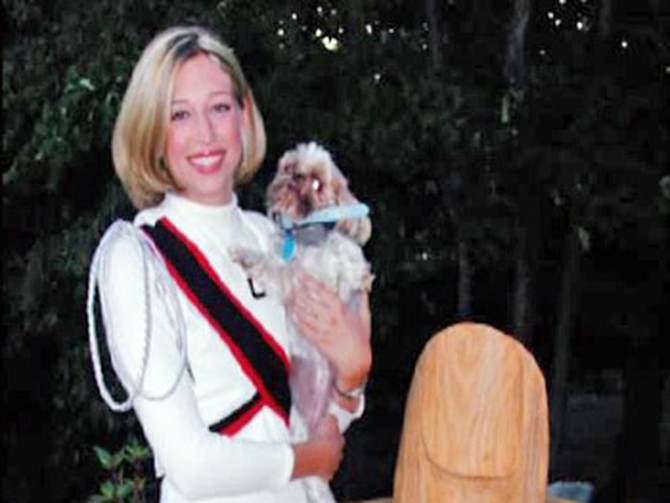
In the summer 2007 book club selection—Middlesex by Jeffrey Eugenides—Cal was born with a condition in which he had both male and female genitalia. After being raised for years as a girl, he finally came to understand that he was genetically a boy.
For centuries society has called the estimated 1 in 2,000 people born a year like Cal hermaphrodites. That term is now considered offensive, and the preferred description is intersex—a term that encompasses at least 30 different conditions, says Dr. Alice Dreger of Northwestern University, an expert on disorders of sex development.
 What is intersex?
What is intersex?
Katie is a medical student. At age 6, she went to the hospital for a hernia operation. In surgery doctors found testes, and she was diagnosed with androgen insensitivity syndrome. Instead of having two X chromosomes like a girl, she has an X and a Y like a boy—but because her body wouldn't react to the hormones, or androgens, that would have made her a boy, her body developed as a girl. She has a vagina, but no uterus. At 14, she started taking estrogen pills so she could develop like other girls, and at 18 she had her testes removed.
"For me, coming here and doing this show is about shedding some light, ... educating people and hopefully making it easier for ... women like myself to be able to talk about this," she says. "To not feel like they have to be ashamed. And, in fact, really just totally lift that shroud of secrecy that covers so many lives."
For centuries society has called the estimated 1 in 2,000 people born a year like Cal hermaphrodites. That term is now considered offensive, and the preferred description is intersex—a term that encompasses at least 30 different conditions, says Dr. Alice Dreger of Northwestern University, an expert on disorders of sex development.
Katie is a medical student. At age 6, she went to the hospital for a hernia operation. In surgery doctors found testes, and she was diagnosed with androgen insensitivity syndrome. Instead of having two X chromosomes like a girl, she has an X and a Y like a boy—but because her body wouldn't react to the hormones, or androgens, that would have made her a boy, her body developed as a girl. She has a vagina, but no uterus. At 14, she started taking estrogen pills so she could develop like other girls, and at 18 she had her testes removed.
"For me, coming here and doing this show is about shedding some light, ... educating people and hopefully making it easier for ... women like myself to be able to talk about this," she says. "To not feel like they have to be ashamed. And, in fact, really just totally lift that shroud of secrecy that covers so many lives."
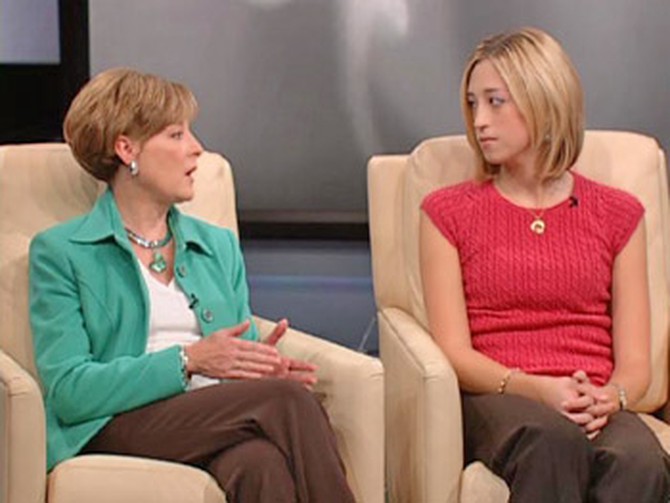
Katie says the secrecy around intersex adds up to a shameful burden on parents and children—but it doesn't need to be that way. "When I came back from the hospital ... that's when they started to tell me a little bit [about my condition], which was one of the best decisions they ever made. They decided right away they weren't going to keep it secret from me."
"We disclosed things to her that were age appropriate," Katie's mom, Arlene, says. "For example, to a 6-year-old, you can talk about having babies grow in your tummy, ... but some people have a family adopting babies. And we stressed those sorts of things. And as time went on, we told her more and more about it."
"We disclosed things to her that were age appropriate," Katie's mom, Arlene, says. "For example, to a 6-year-old, you can talk about having babies grow in your tummy, ... but some people have a family adopting babies. And we stressed those sorts of things. And as time went on, we told her more and more about it."

Being intersex made high school especially awkward for Katie. "So much of adolescence for a girl is about moving through these rites of passage of getting your period and buying your first bra—and having your parents be awkward about it—and going on your first date and all this other stuff," she says. "And I wasn't really doing that stuff at the same time that my friends were. So I felt really isolated in that sense."
At 18, Katie and her parents found a support group of people like her. "I met some really amazing, talented, beautiful, smart women who were just like, 'You know what? This is something that I have. Yes, I used to have testes, but it doesn't mean anything to me in terms of how I live my life. It's just part of me. It's not all of me.'"
Now 22, Katie says something like dating can still be intimidating. "It's always really scary to think about telling someone that I may be dating. And it's something that I build up a lot in my mind and that I get very, very nervous about," she says. "But the fact of the matter is, I've had three boyfriends. My current boyfriend is absolutely amazing. None of them have ever cared at all. One of them, when I told him, was like, 'Okay, so when do you want to go to dinner?'"
At 18, Katie and her parents found a support group of people like her. "I met some really amazing, talented, beautiful, smart women who were just like, 'You know what? This is something that I have. Yes, I used to have testes, but it doesn't mean anything to me in terms of how I live my life. It's just part of me. It's not all of me.'"
Now 22, Katie says something like dating can still be intimidating. "It's always really scary to think about telling someone that I may be dating. And it's something that I build up a lot in my mind and that I get very, very nervous about," she says. "But the fact of the matter is, I've had three boyfriends. My current boyfriend is absolutely amazing. None of them have ever cared at all. One of them, when I told him, was like, 'Okay, so when do you want to go to dinner?'"
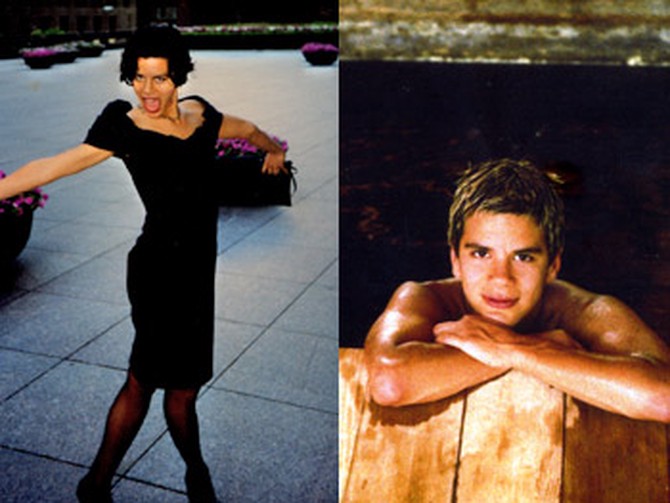
Hida says when she was growing up, she always felt different. "I was more aggressive than other girls," she says. "I really did play and compete more like the boys."
When she was 27, Hida read an article about intersex people and realized that it was referring to people like her. But her condition is different than Katie's. Hida has two X chromosomes, so her body is biologically female. But her body also produces higher levels of testosterone, which is responsible for her male traits. "My clitoris is large enough that it resembles a small penis," Hida says.
Though Hida says she may have identified with boys in some ways, she never wanted to be a boy. "I wasn't really a tomboy in the same way that a lot of non-intersex girls I know were tomboys. Like, I didn't wear boys' clothes growing up. I went to Catholic school, I had the uniform. I didn't have a problem with the skirt."
Now, Hida says she feels and looks "more male" or "more female" in different situations.
When she was 27, Hida read an article about intersex people and realized that it was referring to people like her. But her condition is different than Katie's. Hida has two X chromosomes, so her body is biologically female. But her body also produces higher levels of testosterone, which is responsible for her male traits. "My clitoris is large enough that it resembles a small penis," Hida says.
Though Hida says she may have identified with boys in some ways, she never wanted to be a boy. "I wasn't really a tomboy in the same way that a lot of non-intersex girls I know were tomboys. Like, I didn't wear boys' clothes growing up. I went to Catholic school, I had the uniform. I didn't have a problem with the skirt."
Now, Hida says she feels and looks "more male" or "more female" in different situations.
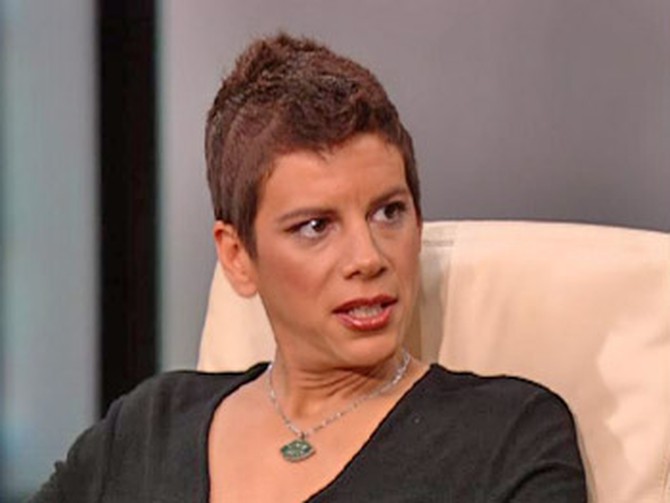
When Hida was born, she says, doctors wanted to perform a surgery to make her large clitoris smaller. But she says her father, a doctor from Colombia, refused. "He was more informed than a lot of parents are and decided, why cut me open if I'm healthy and everything's functioning normally," she says. "Everybody knows you shouldn't operate if you can help it, especially on a baby."
Hida says part of the reason she is comfortable with her intersex body is that she never felt pressure to choose a gender. "Society pressures you to choose sides just like they pressure mixed race people to decide. Tiger Woods talks about it. 'Are you really black or are you really white?'" she says. "I have both, and I'm not going to lie about it or deny it or hide it."
"I am so happy that I'm intersex and that I wasn't operated on or given hormone therapy," Hida says. "I would never change a thing."
Hida says part of the reason she is comfortable with her intersex body is that she never felt pressure to choose a gender. "Society pressures you to choose sides just like they pressure mixed race people to decide. Tiger Woods talks about it. 'Are you really black or are you really white?'" she says. "I have both, and I'm not going to lie about it or deny it or hide it."
"I am so happy that I'm intersex and that I wasn't operated on or given hormone therapy," Hida says. "I would never change a thing."
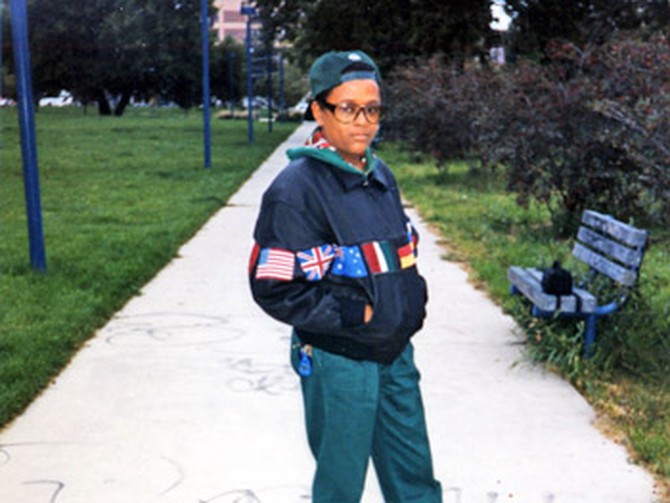
For most of her life, Lynnell lived as a male named Steve. She was born with the X and Y chromosomes of a male, but with hypospadias—a condition in which the penis is not connected to the urethra—and a vagina-like opening. "But since there was no vaginal canal, doctors sewed it together and they pronounced me a baby boy," Lynnell says. "And my mother raised me as her son."
As a child named Steve, Lynnell says she was very effeminate and preferred playing with dolls and jump ropes to "boy things." Because of that, she was teased and called names. Then, in puberty, Lynnell started to grow breasts. "The doctors said, 'You're a guy.' My mother said, 'You're a guy.' But my body's like, 'No, that doesn't make sense.'"
As a child named Steve, Lynnell says she was very effeminate and preferred playing with dolls and jump ropes to "boy things." Because of that, she was teased and called names. Then, in puberty, Lynnell started to grow breasts. "The doctors said, 'You're a guy.' My mother said, 'You're a guy.' But my body's like, 'No, that doesn't make sense.'"
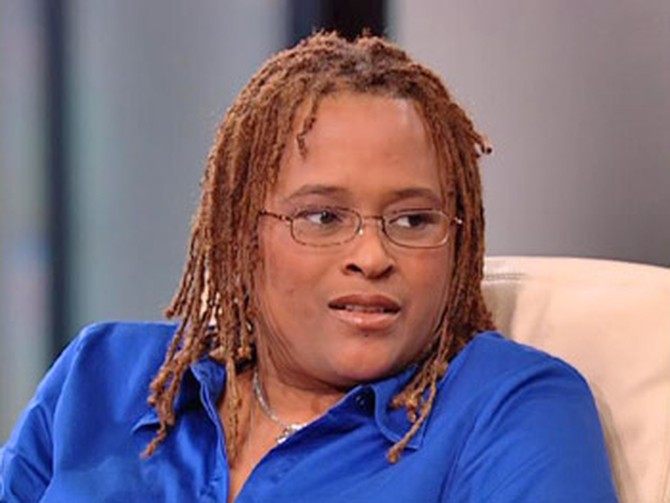
As Steve, Lynnell says she felt like a woman trapped in a man's body. "I felt schizophrenic. I felt there was this person deep down dying to come out, and on the outside was this facade that was just waiting to go away."
So Lynnell tried to make herself act more like a man. "I decided to get married to a woman—to be someone's husband—because I thought it would make me into a guy," Lynnell says. "It didn't work."
The marriage lasted for a year, and then Lynnell says she went through a very dark period. "I wasn't living at all. I was very asexual and just wanted to die."
Fourteen years ago, Lynnell says she gained the courage to live the truth. "I don't think I've ever decided to start living as Lynnell," she says. "I think I decided to stop living as Steve."
So Lynnell tried to make herself act more like a man. "I decided to get married to a woman—to be someone's husband—because I thought it would make me into a guy," Lynnell says. "It didn't work."
The marriage lasted for a year, and then Lynnell says she went through a very dark period. "I wasn't living at all. I was very asexual and just wanted to die."
Fourteen years ago, Lynnell says she gained the courage to live the truth. "I don't think I've ever decided to start living as Lynnell," she says. "I think I decided to stop living as Steve."
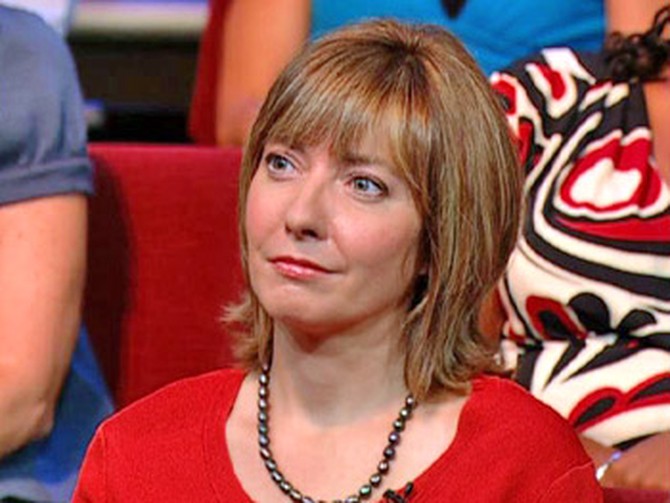
Dr. Dreger says the spectrums of sex, gender and sexual orientation differences are wide. To clear up any confusion, she explains terms:
"There's issues of sex, which is biology—that's male and female and intersex. Then there's gender, which is boy and girl, and sometimes people switch that. And then there's sexual orientation, which is something else in addition—that's whether or not we're attracted to males or to females or to both."
Dr. Dreger stresses that intersex is different from transgender. "Transgender is about a gender identity. And so when somebody is born, everybody gets a gender assignment. Even kids who are intersex get a gender assignment as boy or as girl. What transgender is, is when you feel the assignment you got was the wrong one. So when you grow up later on and you say, 'You know, they said I was a girl but I'm really a boy,' or vice versa."
"There's issues of sex, which is biology—that's male and female and intersex. Then there's gender, which is boy and girl, and sometimes people switch that. And then there's sexual orientation, which is something else in addition—that's whether or not we're attracted to males or to females or to both."
Dr. Dreger stresses that intersex is different from transgender. "Transgender is about a gender identity. And so when somebody is born, everybody gets a gender assignment. Even kids who are intersex get a gender assignment as boy or as girl. What transgender is, is when you feel the assignment you got was the wrong one. So when you grow up later on and you say, 'You know, they said I was a girl but I'm really a boy,' or vice versa."
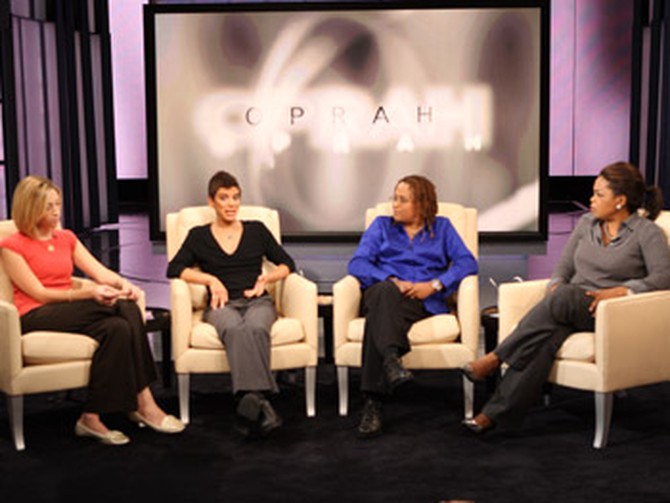
What should parents do if their child is born intersex?
Dr. Dreger says first it's important that they work with experienced doctors to come up with a gender assignment that considers the child's medical issues and does not require surgery unless it is medically necessary. Then parents should raise the child with that assigned gender. Then, parents of intersex children should seek out support groups, like the one that helped Katie and her family. "Being able to meet somebody else like you, another parent of a child who has intersex, is really lifesaving in a lot of ways," she says. "Work with the professionals, but you also recognize there's some stuff the professionals can't do for you that another human being can."
Dr. Dreger says that doctors who perform surgery on children born with intersex conditions are doing so out of "charitable feeling," thinking they will ease suffering. "They're doing it out of a really good place in terms of their attitude," she says. "The problem is that [unnecessary surgery] is not, I don't think, the best way to intervene."
"The doctors have good intentions, but they are speculating," Hida says. "I feel blessed. I would not be a quote-unquote regular woman if you paid me."
In general, we all can try to be more accepting of intersex individuals. "Many times in our society people get locked into wanting people to just be the way they are," Oprah says. "But I really do think that in order for our human species to be able to continue to evolve, that we have to be able to accept all people."
If you are a parent raising a child with an intersex condition or disorder of sex development, or if you an adult living with one of these conditions, learn more.
Get to know the author of Middlesex—Jeffrey Eugenides.
Dr. Dreger says first it's important that they work with experienced doctors to come up with a gender assignment that considers the child's medical issues and does not require surgery unless it is medically necessary. Then parents should raise the child with that assigned gender. Then, parents of intersex children should seek out support groups, like the one that helped Katie and her family. "Being able to meet somebody else like you, another parent of a child who has intersex, is really lifesaving in a lot of ways," she says. "Work with the professionals, but you also recognize there's some stuff the professionals can't do for you that another human being can."
Dr. Dreger says that doctors who perform surgery on children born with intersex conditions are doing so out of "charitable feeling," thinking they will ease suffering. "They're doing it out of a really good place in terms of their attitude," she says. "The problem is that [unnecessary surgery] is not, I don't think, the best way to intervene."
"The doctors have good intentions, but they are speculating," Hida says. "I feel blessed. I would not be a quote-unquote regular woman if you paid me."
In general, we all can try to be more accepting of intersex individuals. "Many times in our society people get locked into wanting people to just be the way they are," Oprah says. "But I really do think that in order for our human species to be able to continue to evolve, that we have to be able to accept all people."
If you are a parent raising a child with an intersex condition or disorder of sex development, or if you an adult living with one of these conditions, learn more.
Get to know the author of Middlesex—Jeffrey Eugenides.
Published 09/21/2007

